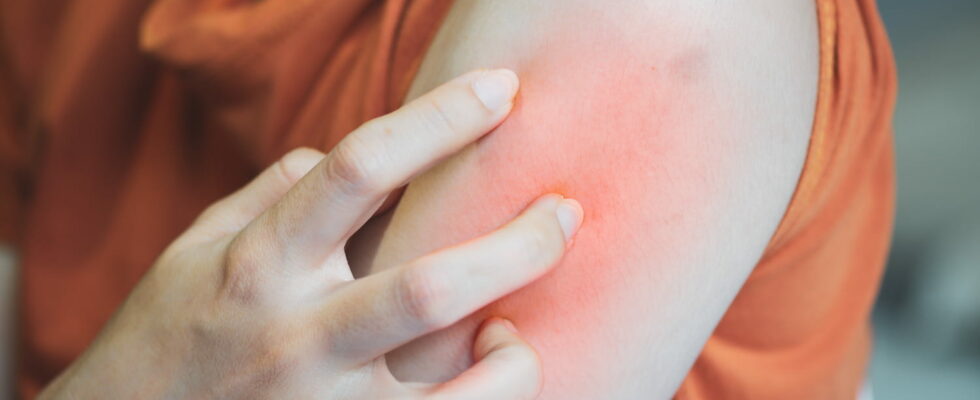Spider bites can cause pain and severe itching.
Spiders sting, or rather bite, only if they feel in danger. Their bite will cause a red, hot and swollen inflammatory reaction, associated with itching.The bitten area is sometimes slightly painful. The lesion is similar to a swelling similar to that induced by a mosquito or bedbug bite but it is distinguished by the presence of two small red holes side by side due to their chelicerae, the hooks that allow them to grab their prey. Very rarely, a spider bite can cause an allergic reaction with hives and Quincke’s edema.“, comments Dr. Marc Perrussel, dermatologist and venereologist. In the event of a spider bite, there are actions to take immediately.
First, disinfect the spider bite with soap and water or an antiseptic solution.Be careful not to rub the wound to try to get the venom out, it could spread and cause a bacterial superinfection. It is better to use a venom extractor“, warns the dermatologist. Ice can then be applied to reduce swelling and itching. “If the lesion itches a lot, you can take an antihistamine such as cetirizine, available in pharmacies without a prescription. If the bite area hurts, oozes and has become infected, this means that there may be a foreign body that has entered at the same time, at the time of the bite. This requires medical advice. If the infection is confirmed, the doctor will prescribe antibiotics“, says Dr. Marc Perrussel.
Spider bites are most often benign.In presence of hives, increased redness, headache, numbness, nausea and vomiting, feeling unwellit is recommended to consult quickly. This is probably a complication related to the venom”notes the dermatologist. Several measures can help reduce the risk of being bitten by a spider:
- Shake out your shoes and clothes well before putting them on;
- Shake out your sheets and blanket well before going to bed;
- Place a few drops of a natural repellent near windows and entry points: lavender, white vinegar or even horse chestnut extract should dissuade them from coming inside;
- When walking in nature, wear long clothing that covers the entire body.
If you catch the spider in the act, take a picture of it. This will help identify it in case of an inflammatory reaction.
Thanks to Dr Marc Perrussel, dermatologist and venereologist at the Rennes University Hospital
